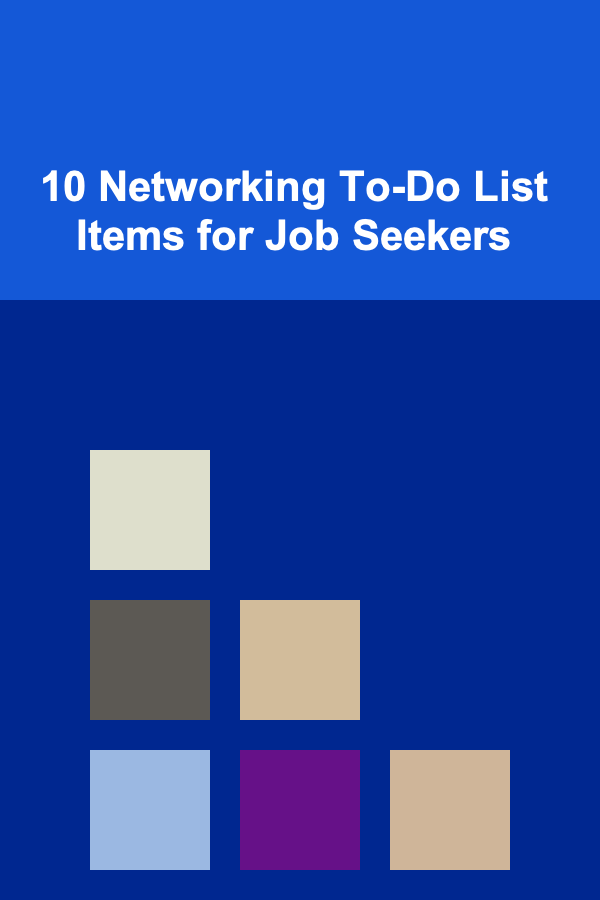
10 Networking To-Do List Items for Job Seekers
ebook include PDF & Audio bundle (Micro Guide)
$12.99$11.99
Limited Time Offer! Order within the next:

Networking is one of the most valuable tools in the job search process. Whether you're seeking a new role, transitioning into a different industry, or exploring new career opportunities, building and maintaining a robust professional network can provide access to unadvertised jobs, helpful career advice, and valuable connections.
While many job seekers know they need to network, they often struggle with where to begin, how to stay organized, and how to ensure their networking efforts yield results. This article outlines 10 essential networking to-do list items that can help you approach networking strategically, manage your connections, and ultimately boost your job search success.
Identify Your Networking Goals
Before diving into networking, it's important to clarify your objectives. Are you looking for a mentor, gathering industry insights, or aiming to connect with potential employers? Defining clear goals will help you focus your efforts and guide your networking strategy.
Why it Works
When you have clear goals, networking becomes purposeful rather than random. It allows you to prioritize whom to connect with and what type of conversation to have, ensuring that each interaction moves you closer to your objective.
How to Implement
- Write down your job search objectives: Are you looking for a new job, exploring a career change, or gaining advice from industry leaders?
- Set realistic, time-bound goals: For example, you might aim to connect with 10 people in your industry over the next month.
- Review your goals regularly to track progress and adjust strategies.
Update Your LinkedIn Profile
LinkedIn is the most widely used platform for professional networking. A well-crafted LinkedIn profile will help you establish credibility and ensure potential connections can easily find you and understand your skills and experience.
Why it Works
Hiring managers, recruiters, and industry professionals often use LinkedIn to research candidates. A polished profile can make a great first impression, increasing the chances of being approached for new opportunities.
How to Implement
- Add a professional photo and an engaging headline that reflects your current career focus.
- Update your work experience, emphasizing relevant skills and accomplishments.
- Customize your LinkedIn URL to make it more professional and easier to share.
- Include recommendations and endorsements from colleagues or managers to strengthen your credibility.
Research and Create a List of Key Contacts
Building a list of professionals in your field is a crucial first step. Start by identifying people who might be helpful to connect with, such as potential mentors, industry influencers, hiring managers, and peers.
Why it Works
Focusing on the right people increases your chances of gaining valuable advice and securing job leads. Researching your connections ensures that your networking efforts are efficient and relevant to your career goals.
How to Implement
- Use LinkedIn, company websites, and professional groups to research people in your industry.
- Create a list of professionals you'd like to connect with, including their job titles, companies, and areas of expertise.
- Prioritize people who are most relevant to your goals and could help you achieve them.
Attend Networking Events and Conferences
Networking events, industry conferences, and workshops are great places to meet professionals face-to-face. These events provide opportunities to build relationships, share your experience, and learn from others.
Why it Works
In-person or virtual events offer a dynamic environment where you can engage with many people in a short time. Face-to-face interaction helps create more meaningful connections and increases the likelihood of follow-up discussions.
How to Implement
- Research upcoming industry events, both virtual and in-person.
- Register for events relevant to your job search and career goals.
- Be prepared with an elevator pitch that succinctly describes your skills and goals.
- Follow up with people you meet at these events within a few days.
Join Professional Groups and Online Communities
In addition to in-person networking, joining professional groups and online communities provides access to a broader network of industry professionals. These spaces often host discussions, share job opportunities, and facilitate connections among peers.
Why it Works
Online communities can serve as an ongoing source of valuable information, collaboration, and job leads. Participating in these groups helps you stay informed while also building your reputation within the industry.
How to Implement
- Join LinkedIn groups, Facebook groups, or Slack communities related to your industry.
- Actively engage in discussions by commenting on posts, offering advice, or asking questions.
- Look for opportunities to share resources, job openings, or articles that may benefit others in the group.
Reach Out to Alumni
Many universities have strong alumni networks that provide an excellent opportunity to connect with experienced professionals who share your background. Alumni are often willing to help fellow graduates by providing advice, mentoring, or job leads.
Why it Works
Alumni are more likely to help you because of shared experiences and connections to your academic institution. This bond can open doors to valuable introductions and insights that can accelerate your job search.
How to Implement
- Check your university's alumni directory or LinkedIn alumni tool to find graduates working in your desired field.
- Reach out with a personalized message, mentioning your shared alma mater and specific reason for connecting.
- Ask for an informational interview to learn about their career path and industry trends.
Practice Your Elevator Pitch
Your elevator pitch is a quick, compelling introduction that conveys your background, skills, and career aspirations in a few sentences. Having a well-prepared pitch is essential for making a positive impression during networking interactions.
Why it Works
An effective elevator pitch communicates your value proposition succinctly and with confidence. It helps you stand out in crowded networking events and sets the stage for deeper conversations.
How to Implement
- Write your elevator pitch by answering key questions: Who are you? What do you do? What's your career goal or value proposition?
- Practice your pitch until it feels natural and engaging.
- Tailor the pitch for different audiences, adjusting it to highlight the aspects of your experience most relevant to the conversation.
Follow Up on Every Connection
Networking doesn't end with an initial conversation. Following up with new contacts is essential to building lasting relationships. A thoughtful follow-up message can keep the conversation alive and increase the chances of further engagement.
Why it Works
Following up reinforces your interest and keeps you top of mind for your contacts. It demonstrates professionalism and persistence, which are qualities many hiring managers value.
How to Implement
- Send a personalized thank-you note or LinkedIn message within 24-48 hours of meeting someone new.
- Mention specific details from your conversation to demonstrate genuine interest.
- Stay in touch periodically with valuable updates or by sharing useful information.
Offer Help and Support to Others
Networking is not just about what you can gain but also about what you can offer. Helping others without expecting immediate returns can build goodwill and strengthen professional relationships.
Why it Works
By offering value, you demonstrate your generosity and expertise, which can encourage others to reciprocate. Building a reputation as someone who is helpful and collaborative will increase the strength of your professional network.
How to Implement
- Offer introductions to people in your network who might be able to assist someone else.
- Share relevant resources, articles, or job leads with your contacts.
- Participate in discussions where your expertise can add value, whether in person or online.
Keep Track of Your Networking Efforts
Staying organized is key to successful networking. Keeping track of your contacts, conversations, and follow-up actions ensures you don't miss opportunities or forget about valuable connections.
Why it Works
A well-organized networking system helps you stay on top of your job search and ensures you're following up with the right people at the right time. It also allows you to track progress and make adjustments as needed.
How to Implement
- Use a simple spreadsheet or a CRM tool to log your contacts, their roles, and your interactions.
- Set reminders for follow-up messages and check-ins.
- Periodically review your networking list to ensure you're maintaining meaningful connections.
Conclusion
Networking is one of the most powerful tools available to job seekers, and taking a strategic approach can significantly enhance your chances of success. By following these 10 essential to-do items, you can ensure that your networking efforts are organized, effective, and impactful.
Remember, networking is not just about quantity---it's about building meaningful, long-term relationships that can lead to valuable career opportunities. Stay proactive, be patient, and invest in genuine connections, and your networking efforts will help propel you toward your next job.
Reading More From Our Other Websites
- [Personal Care Tips 101] How to Speed Up Your Acne Treatment Process with Acne Creams
- [Organization Tip 101] How to Use Color Psychology to Enhance Your Wellness Environment
- [Home Rental Property 101] How to Locate Apartments for Rent with a Community Dog Wash
- [Personal Investment 101] Turn Your Deep Learning Projects into a Money-Making Side Hustle
- [Home Rental Property 101] How to Offer Smart Home Features in Your Rental Property
- [Needle Felting Tip 101] Bringing Characters to Life: Tips for Sculpting Realistic Figures with Needle Felting
- [Home Family Activity 101] How to Create a DIY Family Scrapbook Together
- [Home Space Saving 101] How to Turn Unused Corners of Your Home into Space-Saving Areas
- [Home Renovating 101] How to Organize Your Home Renovation Project: Stay on Track
- [Toy Making Tip 101] Handcrafted Puzzle Magic: Designing and Assembling Custom Brain-Teasers

How to Create a Pet-Friendly Home for New Pet Owners
Read More
How to Soundproof Your Home Against Outside Noises
Read More
How to Start a Family Puzzle Challenge and Keep It Fun
Read More
Navigating the Healthcare Frontier: A Nurse Practitioner's Guide to Emerging Treatments and Innovations
Read More
How to Understand VR Locomotion Techniques
Read More
How to Plan a Product Launch with Limited Budget
Read MoreOther Products

How to Create a Pet-Friendly Home for New Pet Owners
Read More
How to Soundproof Your Home Against Outside Noises
Read More
How to Start a Family Puzzle Challenge and Keep It Fun
Read More
Navigating the Healthcare Frontier: A Nurse Practitioner's Guide to Emerging Treatments and Innovations
Read More
How to Understand VR Locomotion Techniques
Read More